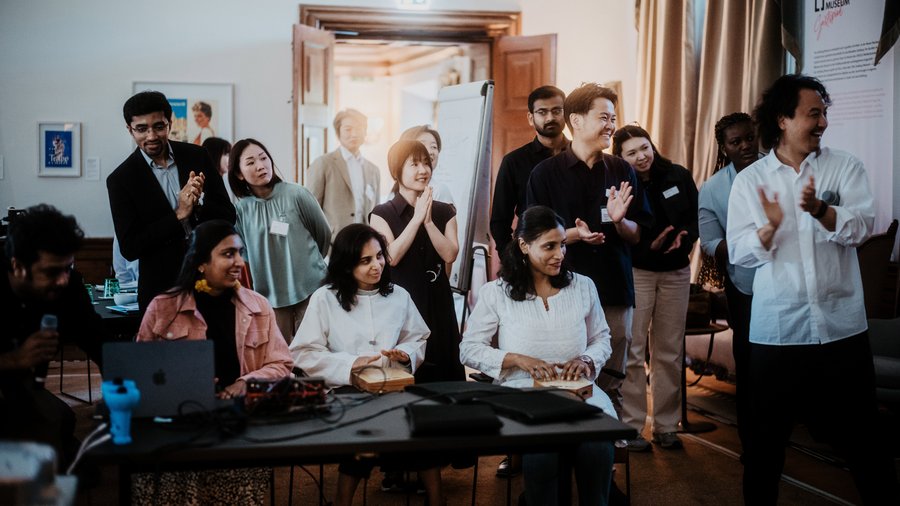Salzburg Global Fellow Pragya Jain reflects on how the Japan-India Transformative Technology Network sparked creative collaboration
This article was written by Salzburg Global Fellow Pragya Jain, who attended the Japan-India Transformative Technology Network from April 27 to May 2, 2025.
In an increasingly interconnected world, programs that foster cross-cultural collaboration and innovation are more important than ever. Salzburg Global's five-day in-person session of the Japan-India Transformative Technology Network exemplifies how diverse minds, when brought together in an open, structured, yet flexible setting, can generate not only new ideas but also new ways of thinking. This workshop didn’t just encourage dialogue—it became a model for learning, co-creation, and cross-border understanding.
A Global Tapestry of Talent
At the heart of the program was its incredible diversity—not just in nationality, but in perspectives, experiences, and aspirations. While India and Japan formed the program’s core, participants also included individuals from Austria, the U.S., Ukraine, Kosovo, South Korea, Kyrgyzstan, Puerto Rico, the Netherlands, and more. This global confluence created an environment that was intellectually stimulating and culturally rich. For anyone who thrives on learning from others, especially from different cultures, this workshop was nothing short of a treasure trove.
Structure with Space to Explore
What set this experience apart was its unique design. The session had a clear structure: sessions were pre-scheduled, complete with agendas and designated breakout rooms. However, the real magic lay in the freedom it allowed within that framework. Participants shaped the content, steered conversations in directions that mattered to them, and formed self-organized groups to tackle real-world issues. This mix of defined structure and organic development created a productive yet liberating environment—one that nurtured creativity, ownership, and deeper engagement.
Designed For Connection, Not Just Participation
Workshops often risk favoring the most outspoken voices, particularly in multicultural settings where language, communication styles, and social norms vary widely. But here, the design of interactive activities ensured inclusivity. Through thoughtful engagement strategies, by the third day, participants had broken the ice, found common ground, and discovered each other’s strengths. Beyond professional collaborations, genuine friendships were formed—something often missing in high-intensity professional environments.
From Dialogue to Deliverables
Despite the informal tone of many sessions, the program wasn’t all talk. By the end of four days, teams had shaped tangible outputs. These projects emerged from open-ended discussions but were refined into structured ideas, proving that creativity and productivity aren’t mutually exclusive. Yes, consensus-building was occasionally slow and even frustrating, but the results—solutions aligned with individual goals and collective excitement—made the process worthwhile.
Cultural Insights and Personal Growth
Beyond collaborative work, the session offered a window into different cultures, work styles, and individual motivations. It was a safe, encouraging space where participants could speak freely—about their work, their ideas, and even their personal journeys. Exposure to projects beyond one’s area of expertise offered fresh motivation and perspective. For someone from a consulting background who has worked on various social themes, it was a humbling reminder of how vast and varied the world’s challenges—and solutions—really are.
Evolving Ideas, Expanding Horizons
Initially, my application to join the program included a proposal on women's safety. Yet, through rich conversations and shared exploration, new areas of interest and contribution emerged. This highlights a key lesson: Creativity and clarity often come not from solitary thinking, but from collective ideation. While the original project remains relevant, the network broadened my scope of interest, showing how collaborative environments can unlock hidden potential.
Lessons for Everyday Work Culture
There’s a lot organizations can learn from the way this session was run. Whether it's onboarding new employees, building sub-teams for specific projects, or running internal workshops—creating a balance between structure and freedom, encouraging open dialogue, and making space for cultural intelligence can transform how teams work. It's not just about achieving goals; it’s about doing so in a way that’s inclusive, inspiring, and deeply human.
Final Thoughts
The Salzburg Global Japan-India Transformative Technology Network wasn’t just an event—it was an experience. One that showed how when diversity meets intentional design, the outcome is far greater than the sum of its parts. As the world continues to grapple with complex global challenges, programs like these don’t just build networks; they shape the next generation of thoughtful, collaborative leaders. And for those of us lucky enough to be part of it, the learnings will carry forward into our daily work, our teams, and our vision for the future.
Pragya Jain is a senior research manager at Ipsos Research Private Limited in India. Pragya is a seasoned expert in quantitative research, data analysis, and monitoring and evaluation, and specializes in experimental and quasi-experimental research designs. With over 15 years of experience working with both for-profit and non-profit organizations, she has led large-scale program evaluations for Government of India initiatives and aid activities supported by the Asian Development Bank, World Bank, Opportunity International, Bill & Melinda Gates Foundation, United Nations, and various central and state government departments.
Learn more about the Japan-India Transformative Technology Network.


